@moshe said in A little humour:
I need to create a porn name for myself...
Any suggestions?moshe
Well, currently "Stormy Daniels" has a popular following...
How about "Cyclone Moshe"?
@moshe said in A little humour:
I need to create a porn name for myself...
Any suggestions?moshe
Well, currently "Stormy Daniels" has a popular following...
How about "Cyclone Moshe"?
@Kehaulani said in Posting Photos:
When I click on the Upload Picture icon, I get , but there is no URL.
Are you are using the one high lighted in grey? Second icon from the right?:

This one takes you immediately to your computer file search (not to an internet URL search)
You should then get a window like this:
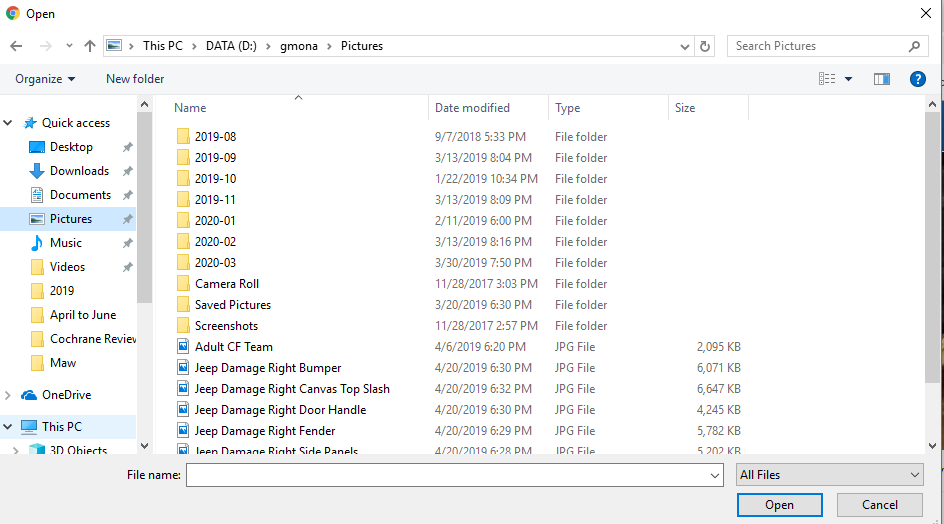
Then choose the picture file you want:
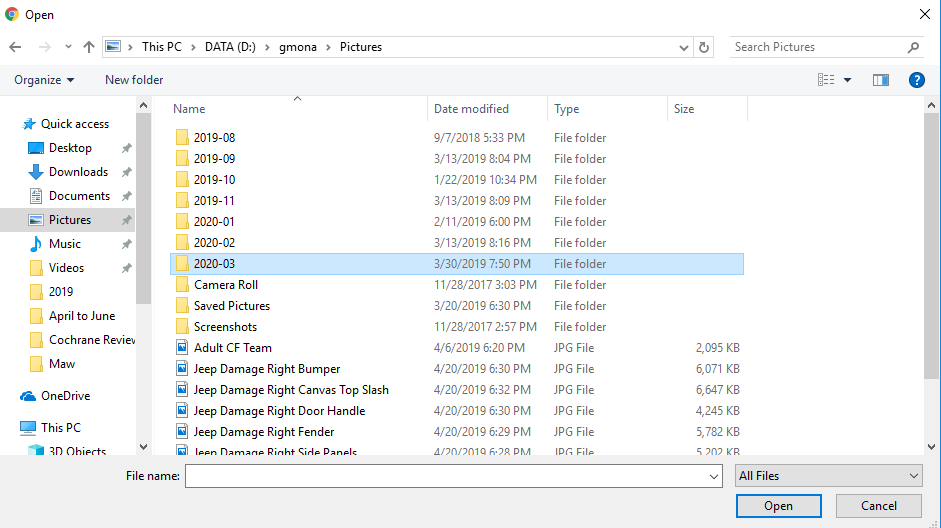
Open that file up:
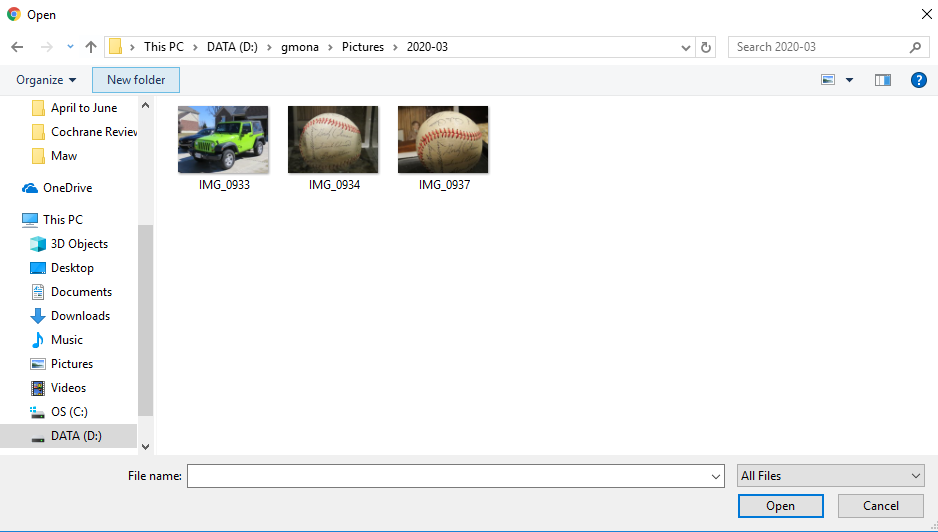
Then click on the picture image you want, hit open... then it should post
@Richard-III said in Posting Photos:
Click on upload image from the icons above on the reply page and choose your photo. Done.
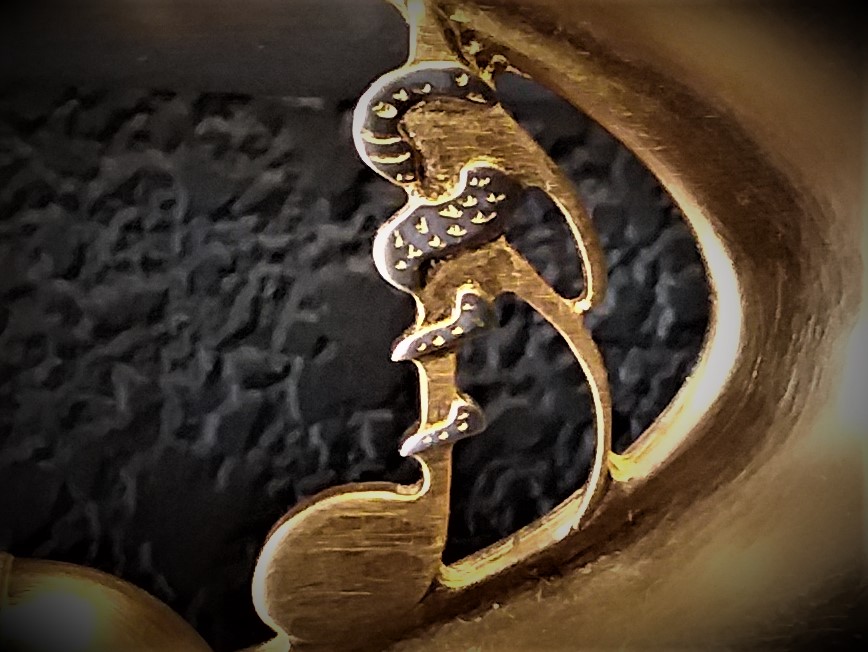
OR doing at as Richard II suggests also worked as I just tested this method with my TB avatar image.
I had this problem once and I was told by my IT assistant that it was a Cortona setting issue. He did a reset for me and now all entries appear. If you have an IT contract (as I do with Dell) then I would give them a call to try to reset the Cortona defaults.
Gary. Go to Windows tool bar at: "Type here to search" and type in "Snipping Tool". Then choose "New" and capture the photo you went with the + tool that appears. Next, go back to the menu, choose "Edit", then select "Save". Once you do this go back to the TB window and select "Paste". It will soon appear.
If you get the Error message (image is too large) then I find if I open Microsoft word, paste the same saved snipping tool picture into the word document, I can play with the size until TB accepts this.
Hope this helps.
@J-Jericho said in Top 50 Jazz Trumpeters of all time?:
Doc Severinsen; Jon Faddis; James Morrison; Conte and Pete Candoli; Lew Soloff
These are huge omissions. I know of two others that will never make the list as many do not respect their originality or music, but I would include Herb Alpert and Chris Botti as well. AND technically proficient above the all (albeit not as prolific in the commercial productivity world) there is also Alan Vizzutti.
AND just imagine the how much of a giant Roy Hargrove would have become if not for his untimely end on this spiritual plane.
HOWEVER: If you do want a bit of humor to the above post, here is a picture of me in the band that paid my way through college.
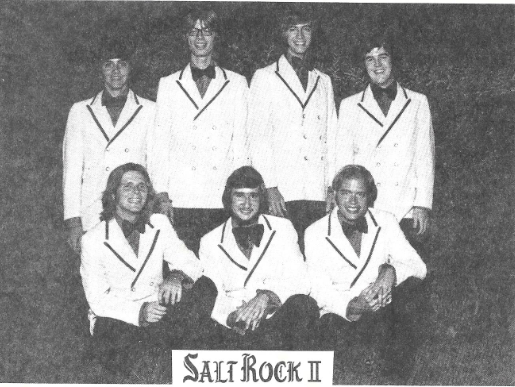
I know this is a humor thread, but the latest discussions has been the "humor" around wages in the 1970's. I would add to this discussion a rather "humorous" twist to wage comparisons to today being so low in relation to today's wages. During the 1970's, I had experienced the opposite effect.
From 1974 to 1977, I played in a very successful rock band. We played as a house band 4 nights a week and were able to typically book a 5th day of the weekend at other venues. Our manager made sure all venues (including the house band gig) paid us $100 a man... Yes, in the mid 1970's! So as a college student I was bringing in $400-500 a week at a time when my tuition was $300 a quarter, and room rent was $86 a month. Needless to say, I needed no parental financial support, was able to buy my own car, pay for my own food (I did go home on weekends to do laundry at Mom's house), and save money in my first personal bank account.
Today, I have to really fight when on my own to get a gig that pays me a $100 performance fee. Fortunately, when I get a Union gig, I will receive more then the acceptable $100 minimum. So not much has changed from club's willingness to pay musicians from 1970 to 2020 dollars. Actually, there is really not much humor in this comparison, but it is laughable!
@flugelgirl said in Easter Services:
...I suppose I owe it to all the very diligent practice I put in early on and also to about 6 or 7 years of Brass Quintet where I played it in a group almost daily.
And that my friends is how it's done!
@administrator said in LONG TONES:
I'm not a fan of "long tones." Hear me out (I do have a degree in trumpet performance):
As trumpet players, we hardly ever just play a single note and hold it as long as we can.
I hope we are not confused here. Long "tones" are for effective and judicious warming up. I don't know of any routine effort to apply the concept of Long "tone" playing to the performance mode.
Let me try to clarify that Long "tones" is to get us ready to go into the performance mode, which as you appropriately state: "...we hardly ever just play a single "note" and hold it as long as we can." So with your last comment, I totally agree. Long tones does NOT equal Long notes.
So I heard you out. I have degrees in the clinical practice of medicine and a degree in the conduct of medical research that makes the concept of Long "tones" a physiological tool for enhancing embouchure readiness a practical application for the musician (with or without music degrees).
...AND with all of our degrees together in total, we are able to purchase a coffee at Starbucks for $4.00.
@Kehaulani said in LONG TONES:
Bob, any chance that we could have you post your warm-up/long tone (Blee) exercises? Thanks.
Hmmm... it has been 50 years in my head and I do not have it formally written down anywhere. Let me write it down when I get a chance (probably during my next rehearsal period later today) and I will then post it.
@Robrtx said in LONG TONES:
Gary,
What is your view on the "Cat Anderson 'Whisper G'" long tone method compared to traditional long tones, in terms of effectiveness from a muscle physiology perspective and why?
I was given this exercise by my Jazz Orchestra Band Leader, again Eddie Brookshire, so have used this method. I, unfortunately (or fortunately - depending on prospective) would proceed ONLY after FIRST starting my Eugene Blee warm up method. What I found out about adding Cat Anderson's method (who works under the theory that the in staff G is the philosophical most ergonomically designed note on which to begin a warm up) to my exercises, is my range work has became more efficient.
This is all much to the dismay of my band director, Eddie Brookshire that is now begging me to contain my projection as I have over achieved for my master. I do believe however that my Harrelson Summit has something to do with that as well.
While not related to vocal "warm ups" there is another important concept to using vocal cues for phrasing passages on the trumpet. Another teacher, not necessarily formally but though default, actually his fault for choosing me for his quintet, Eddie Brookshire (a bassist) taught me the importance of reading the words written UNDER THE NOTES when they are present that takes priority over the notes that may be written above the words. Here is Eddie's wisdom behind this concept:
Eddie sees the notes written as the song writer's way of "graphing" the phrasing of the lyrical component to a song. Songs are there to provide a message, and there is no stronger way to provide that message from the intent of the song writer then reproducing the word phrasing. But sometimes as Eddie describes, the graphical depiction of that quarter note, eighth note, dotted eighth note to sixteenth note just cannot accurately "graph" the spoken, written intent of the phrase. To get around this, just read the words, not the notes, and your phrasing as to the intent of the song writer will be spot on.
HOWEVER: As trumpet players, we can absolutely benefit from either reading or thinking of the phrasing of the notes we play through vocal cues.
Another teacher I studied under while living in New York City, Claudio Roditi, taught me the importance of stopping on difficult phrases, stepping back and then first attempt to sign then through, before picking up the horn and making another attempt to progress through the passage. With this skill (even if you can't carry a tune, like me) you can still feel the flow of the phasing through the larynx/pharynx and ear/mouth coordination. This technique makes it so much easier to understand were my trumpet phrasing is going wrong, and through vocal attempts, find the solution and then apply this to my trumpet phrasing approach.
If I attempted a vocal performance.... Whether using these warm up routines or not.... The audience would end up GIVING ME the Exhaled Hiss! So I guess, warming up the audience isn't too bad of an idea!
Warm up: Part 2
So Eugene Blee taught me 2 components of warming up. You just read the Part 1, Long Tone component, Then he taught me Part 2, which immediately follows. So once you have those motor units primed and optimized, it is next important to start the muscle groups functioning in that optimal configuration before that start up muscle memory is lost. So Eugene taught me to work through a chromatic sequence of lip slurs that again is part of my warm up routine. This gets the now optimized muscle fibers to begin to glide in a highly coordinated manner to train the muscle to function now with optimal control.
You know until I became an academic physician, I did not understand the process... it just worked for me. Since by PhD training as a bioinorganic chemist, my MD training as a physician and by trumpet training from Eugene Blee, I now understand the process and the genius behind Eugene. Thanks so much Mr. Blee for giving me this special gift.
My take on long tones: As a trumpet player; As a physician that taught muscle physiology for 27 years at a medical school.
As a trumpet player. I studied for several years under Eugene Blee, the longest running Principle Trumpet player for the Cincinnati Symphony Orchestra. He was the individual that drilled into me the importance of warming up with long tones. He taught me this skill in the 1970's. I still use this today, almost 50 years later. I use his exact routine before I start ANY rehearsal or performance when time is under my control. Why? Because I have been very successful when playing for an audience for these 50 yeaars. The RARE times I have not been able to use his warm up because I have arrived late at a performance, I fatigue early into the performance. So for me, those long tones are essential to get warmed up so to make it through even the most demanding performance.
As a physician teaching muscle physiology. Long tones gets the muscle fibers to align to a performance strength demand while gently providing blood flow to the muscle fibers. That stretch coordination is vital to keep the motor units to function optimally as a group in series that will minimize fatigue. Blood flow is essential, not only to get oxygen into the muscles to allow as much aerobic combustion with optimal ATP production (the bottom line fuel source for muscle [ATP is NOT only the racer's edge... also the Trumpet player's edge]) . THEN there is the exhaust. Once this oxygen burns, phosphate bonds are transferred and consumed, carbon by-products begin to form. The most stress causing carbon by-product is lactic acid. Lactic acid is removed and eliminated by the liver, but you got to get it out of the muscle and delivered to the liver to prevent a back up in the muscle AND for the liver to convert that lactic acid back to glucose to recycle that fuel source BACK to the muscle (This is called the Cori Cycle). That is the second essential component of blood flow, it gets the lactic acid out.
So putting it all together: Long tones improve blood flow to muscle that is being recruited for performance. The blood flow gets oxygen in and toxic by-products as a consequence of this oxygen delivery out. So if we are using long tones EFFECTIVELY this process WILL optimize performance.